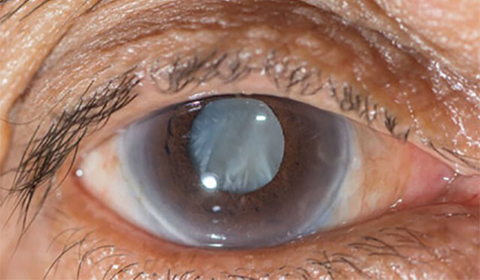520-229-1554
Fax 520-229-1702
520-229-1554
Fax 520-229-1702
Catalina Surgery Center
7508 N La Cholla Blvd
Tucson, AZ 85741

Your eye’s natural lens sits behind the iris and pupil and works similarly to a camera lens. This natural crystalline lens of the eye is clear and is primarily responsible for focusing light on the retina. Any clouding of the natural lens is called a cataract. Cataracts cause blurry vision that affects the person’s ability to see clearly and function effectively.
Cataracts occur most commonly as a result of age and everyone will eventually have cataracts if they live long enough. Some people develop cataracts at a young age and these can be a result of heredity, trauma, diabetes and certain medications.
During cataract surgery, incisions are made on the cornea to go inside the eye, break up the lens into small pieces, and take them out during a process called phacoemulsification. A clear artificial lens implant, with a power suited for your eye, is inserted into the capsule that held the native lens in place.
Not all surgery centers have access to one, but a femtosecond laser can be used to make some of the key incisions automatically, and it makes some of the main steps a little more safe. It can also correct astigmatism (a refractive error of the eye caused by the cornea not being completely spherical), which will decrease your need for spectacle correction after surgery. Catalina Surgery Center has the LENSAR femtosecond laser, and we are pleased to be able to offer this service to you.
The lens in the eye can become cloudy and hard, a condition known as a cataract. Cataracts can develop from normal aging, from an eye injury, or if you have taken medications known as steroids. Cataracts may cause blurred vision, dulled vision, sensitivity to light and glare, and/or ghost images. If the cataract changes vision so much that it interferes with your daily life, the cataract may need to be removed. Surgery is the only way to remove a cataract. You can decide not to have the cataract removed. If you do not have the surgery, your vision loss from the cataract will continue to get worse.
Your doctor will discuss with you which lens is best for you and if you are a candidate for a Premium IOL (or "Specialty lens"). Keep in mind- each patient is different so the lens that the doctor recommends for you is what he or she believes is the best choice for your specific case.
PanOptix® Patient Brochure (PDF)
Vivity View Patient Brochure (PDF)
With LENSAR advanced technology, we can offer you a better, more precise cataract removal procedure that is customized to your eye’s own unique size and shape. Learn more at http://www.lensar.com/lensar.php
LENSAR Laser System (PDF)
Yes. No eating or drinking 8 hours before your surgery arrival time.
Yes. You will need a driver to pick you up from the surgery center.
IMPORTANT: Your driver to pick you up after surgery CANNOT be an UBER/LYFT or taxi due to Medicare guidelines. Your driver must be a spouse or partner, friend, or family member only.
For your safety, we have a list of approved/CPR certified drivers who can arrange a ride for your surgery. Ask the surgery scheduler when you schedule your procedure and they will provide you with appropriate phone numbers for your situation.
Yes. You will start a couple days before surgery and a duration of at least 4 weeks post surgery.
Yes, you may take a shower on the day following the procedure. However; for the first few days following your surgery, be cautious not to allow any water to enter into your eyes by keeping them closed and allowing the water to run off the back of your head. While shower water is unlikely to cause any direct damage to your eyes, it may induce you to rub them which you should not do after surgery.
Yes. During the first week after surgery:
NO swimming for the first 30 days after surgery.
It is normal for your operated eye to feel "scratchy." Your vision in the operated eye will fluctuate for a few weeks after surgery.
You may take aspirin, acetaminophen, or ibuprofen as needed.
Please call our office at 520-229-1554 if you feel nauseated, begin vomiting, have severe eye pain or notice a significant decrease in vision.
If you are recovering in the United States, please wait at least 2 weeks after surgery before flying. If you need to travel by airplane out of the United States, please wait at least 3 weeks after surgery. Keep in mind that if you have any issues while away that you should take the proper steps to be seen.
If you have had your procedure and are unsure if you need to be seen or not call our office at 520-229-1554 to discuss your situation.
Every insurance plan is different. It is the patient's responsibility to research what their insurance will or will not cover.
We highly encourage each patient to call their insurance company and inquire on cost prior to surgery. The patient should find out if their insurance will need a prior authorization, if their specific insurance will cover for anesthesia and if their insurance will cover the procedure or not. The phone number for your insurance company will be on your insurance card.
Our surgery scheduler can help you with locating your procedure code (CPT code) to give your insurance company to find out that information accordingly.
Call 520-229-1554 to schedule